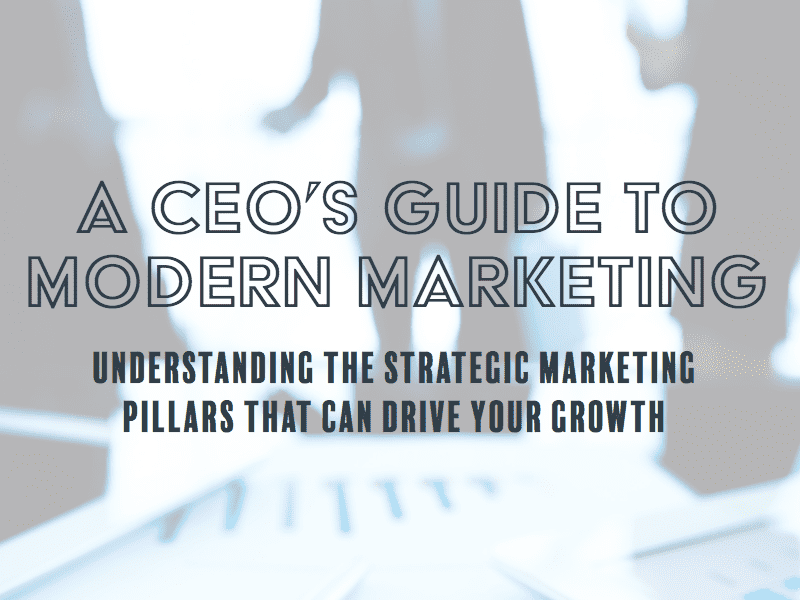What Is Strategic Marketing Planning?
In some ways, asking “what is strategic marketing planning?” is as silly as asking “what is strategic construction planning?” No one would question that an architect or contractor needs a strategic plan to construct a building. Obviously, you don’t build the walls until you have a foundation, you don’t put in plumbing until you’ve gotten the proper municipal water authority contracts, or you don’t begin hanging art before you’ve broken ground.
But these out-of-order, strategy-devoid planning practices are pervasive in marketing programs within every industry, and at every level of marketing expertise.
LEARN MORE: The 7-Step Strategic Marketing Planning Process
That said, it’s understandable that it persists as more people have become de facto marketers of themselves on social media. “I know how to post on Instagram” is the battle-cry of anyone who thinks they can save a buck by jumping into marketing without a true, strategic plan. Of course, these impromptu “strategies” rarely move the needle. So, what, truly, is a strategic marketing plan and how can you ensure there is one in place that will help grow your business?
Aligning marketing with business goals
Above all, a strategic marketing plan must be aligned to your strategic business plan. To produce successful marketing results, a marketing program must deliver upon a company’s goals and objectives. It cannot exist on its own merits; a strategic marketing plan must serve the business and further its goals through the lens of prospect, community, and/or customer engagement.
If you plan to work with a marketing agency or contractor and they don’t ask for your business plan within your first few conversations, run away. From a marketer’s perspective, I wouldn’t want to work with any leader that hasn’t taken the time to develop a thoughtful, short- and long-term business plan that clearly outlines where they want their business to go in the next three to five years.
Setting up a strategic marketing plan
With a deep understanding of your business plan and discussions with your key stakeholders, the right marketing partner should be able to take the next steps in the strategic marketing planning process – goal alignment, marketing audits and market research. Let’s break down these connected tasks:
1. Goal Alignment
There are business goals (e.g., revenue, growth, service). And then there are audience goals (most typically, “solve my problem” or “delight me”). A key tenant of any strategic marketing plan is clearly connecting these sets of goals through activities and messaging that brings the audience to the obvious conclusion that your business is aligned to their needs. This results in a list of strategic marketing goals (e.g., engagement, awareness, conversion), designed to activate the alignment.
2. Marketing Audits
While marketing audits might take various forms, their purpose is singular – a survey of any current assets within the business that is being used for current marketing efforts or could be used for future ones. Audits should encompass content, systems, spokespeople, materials, or any other number of potential marketing assets. A strong, strategic-focused audit should both collect the assets and evaluate them for usefulness, maximizing when possible and identifying gaps as necessary.
3. Market Research
Strategic marketing planning’s foundation is, in many ways, only as strong as the market research on which its built. You need to understand what’s happening around your business and your customers to truly deliver effective marketing messages in ways that activate engagement from them.
The easiest way to approach the research is through what I like to call the Three C’s – company, competition, community.
- Company – What products or services are ripe for marketing? What elements should be leveraged, and which shouldn’t have marketing support?
- Competition – How are other companies in your space positioning themselves and where are potential gaps that marketing can fill?
- Community – Finally, what’s happening in the “community” in which your business runs? Perhaps that’s local community, but more often it’s the industry in general. Where is the industry heading, where are opportunities for growth, and where are the unique spaces no one else has yet explored?
Execution starts with strategic marketing planning
By this point, there is enough background, information, and insight that the marketing execution plan can begin to take shape. Too often, these are just marketing plans that quickly jump to tactical elements (“post on social media 2-3 times/week”).
What sets strategic marketing planning apart is perhaps most visible in this area. (Can you guess the critical word that does that? STRATEGY.) A marketing plan devoid of strategic imperatives will never truly move the needle for your business. Thoughtful strategy explains why work is being done, not just that it’s done.
I often use a Middle Ages-themed military analogy to explain this. In a war, the goal is to win key battles. Strategies to achieve that goal might include taking the enemy by surprise and capturing their troops. That’s tactically delivered by approaching under the dark of night, leaving horses behind to reduce noise, and setting off flashes to confuse the sleeping troops. Now that might be simplistic, but its frankly the same in marketing.
How do I know what to post on social media if I don’t understand what we’re trying to achieve through that promotion? How will marketing KPIs ever be reached if we have no idea why we should construct one blog topic over another? Jumping right into tactics without a strategic imperative backbone spells disaster. (Although, thankfully, no one will go to the gallows for it!)
Getting resources in place
A final word on a critical element, often overlooked by both company leadership and many marketing professionals, that can make or break even the most strategic marketing planning. In more cases than not, even highly strategic marketing plans are not aligned with company operations. A full marketing program is in place before anyone realizes that the company cannot fulfill the increased engagement and leads being driven, bringing the entire engine to a halt.
Operational throughput should be considered both throughout the strategic marketing process and throughout execution to truly realize marketing’s potential to drive growth. Sometimes that means transforming your marketing department with flexible resources from a fractional marketing team.
Writing and deploying a marketing plan is one thing. Constructing a strategic marketing program, built upon the foundation of knowledge, strategy and creative execution can be a game changer for your business. That’s exactly what Marketri does – we use our extensive experience to transform outcomes through strategic marketing planning and program delivery. Book a call with our CEO Deb Andrews to learn more.





